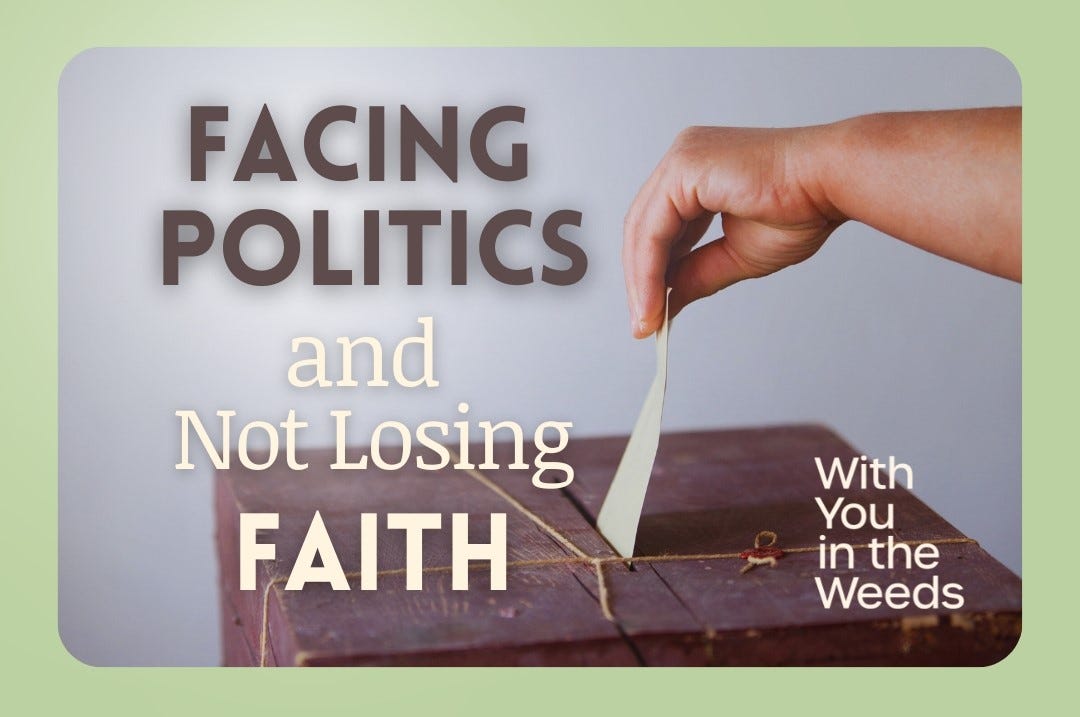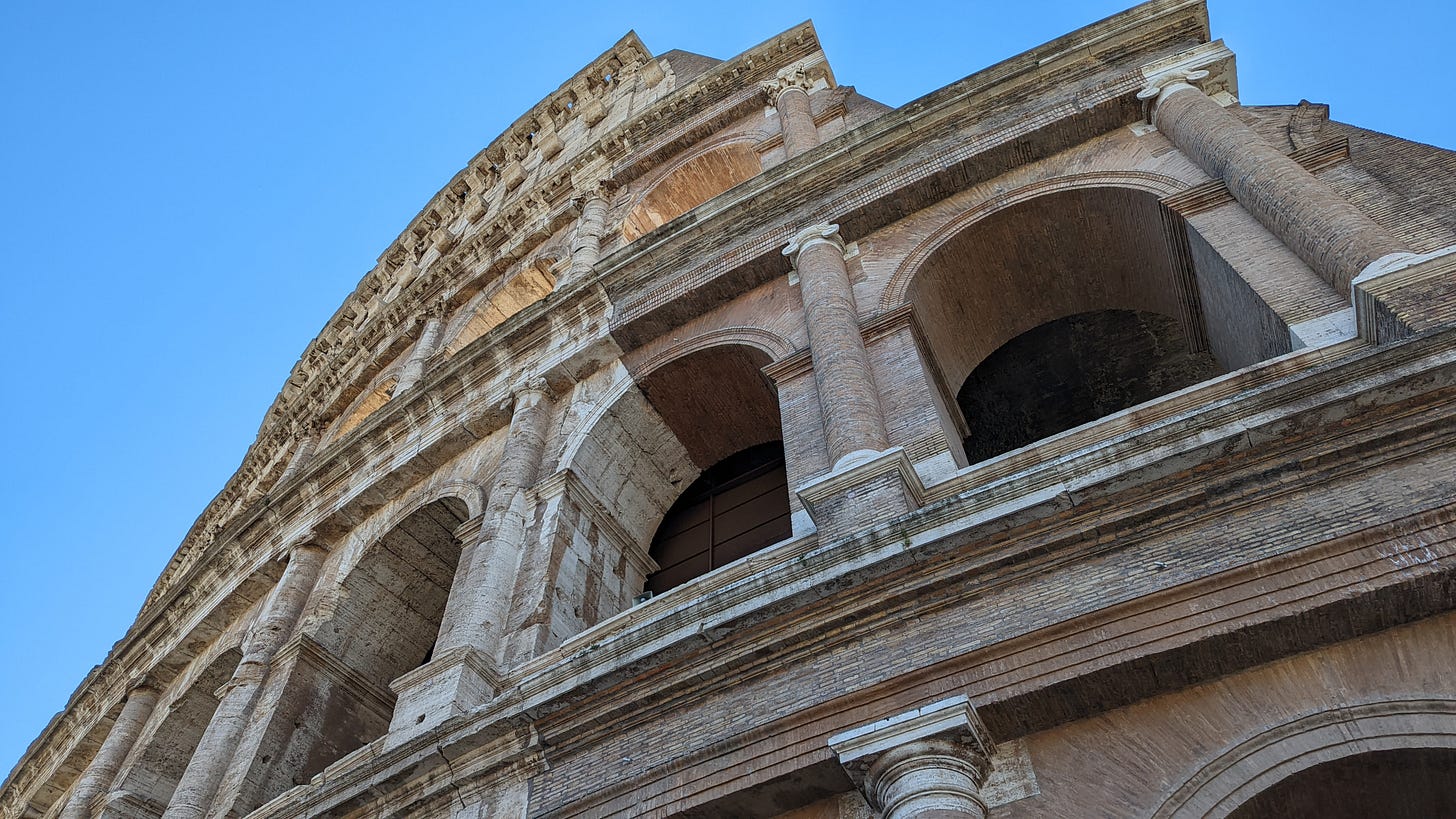Facing Politics and Not Losing Faith
How should you navigate political issues?
Listen in: Facing Politics and Not Losing Faith
One of the most difficult questions you may face is whether or not to be involved in politics, and if so, how to align your spiritual beliefs with your political beliefs. Because it can be so challenging to figure out, many Christians simply stay out of politics altogether. So the question we want to address is: How can you engage with politics in our polarized culture and not become disillusioned or confused about how faith relates to politics?
In the fifth episode of our series, Facing Reality and Not Losing Faith, John and Shay will address this often thorny, divisive, and controversial topic by looking at the historical role of government using biblical principles for guidance. They discuss how God designed the role of government, offer perspective on the divisive nature of politics, and address the ways that politics can become a burdensome idol in our lives.
A Biblical View of Politics
We’re going to mention political parties in our discussion because they are a reality, but we’re not arguing for one political party over another. We know that government is God’s grace to us and can serve us, but we make it into a tyrant and a god when we put our hopes in it. It’s helpful to remember: Government makes a great servant but a terrible master.
God created us in His image, which means we are under a divine mandate to subdue the earth, and we do so within a community of other people. Our word “politics” is conceptually related to this idea of community. In Latin and Greek, politics means “citizen” or “city”. Ideally, the government should work toward a common good in which people can flourish.
In Genesis 1 & 2, God made a beautiful garden and told Adam and Eve – the first community – to make it even more beautiful. As His image bearers, they were told to beautify themselves by reflecting the character of their creator. That’s two mandates: make beauty and be beautiful. This is difficult to do now that sin has distorted our fallen world.
Until God returns to establish His kingdom, we will face multiple points of frustration as we work to do good and be good. Politics is a way to continue our calling to inject beauty into this fallen world as much as we can, by exhibiting God’s character traits: humility, patience, peace, truth, and lovingkindness.
Paul told the early Christians to pray about the politics of their day for a certain purpose – so that they could live tranquil and quiet lives:
First of all, then, I urge that entreaties and prayers, petitions and thanksgivings, be made on behalf of all men, for kings and all who are in authority, so that we may lead a tranquil and quiet life in all godliness and dignity. - 1 Timothy 2:2
While it’s tempting to think that things were simpler back then, the political environment of Paul’s day was just as severe - or worse - than anything we are facing today: Christians were being put to death, women were denigrated, slavery was institutionalized, taxes were exorbitant, and rulers mistreated their people.
So you may be asking, why should you try to be good and do good (especially in the political arena) if everything is subject to futility? The simple answer is that as a follower of Jesus, your hope is in something greater than this world and you are called to “practice for heaven”. God is sovereignly directing everything in history - including politics and political leaders - to achieve His end goal for this world and to eventually transition this world into the way things should be.
Politics as Idolatry
Everyone is guilty of idolatry. We all look to something other than God to be our source of identity and security. We may look to money, success, looks, power, family, or reputation to give our lives meaning and happiness. Even politics can become an idol. It’s our new religion that we look to for meaning and purpose.
But this is a problem because all governments are flawed, and made up of sinful individuals. Pride, power, and greed are constant temptations. You may hope and pray for leaders with character and competence and be sorely disappointed. Some people put so much hope in their political party, they think if their candidate doesn’t win the election then the world is going to come to an end, and they vow to leave the country.
So how do you know if you idolize politics? Here are some checkpoints to consider:
You think it’s obvious that every Christian should agree politically with you.
You have a hard time understanding how a Christian could vote for your political opponent.
You’d rather your child marry a non-Christian of your political party than a Christian of the other party.
You’d rather try to win a political argument than win someone to Jesus.
You get more excited about your party/candidate winning an election than you do your church growing by adding people to the body of Christ.
You’re willing to overlook immoral behavior from politicians on your side but not on the other side.
You trust your party or candidate to provide a good life for you.
You can’t distinguish between Jesus’s platform from your parties’ platform, even though one side might reflect the Biblical worldview better.
How Do We Then Live?
We’re going to address this in two parts: the role of the church and the role of the individual.
The Role of the Church
Is political involvement for Christians important? Let’s look at Jesus’ words in Mark 12. When Jesus is asked if it is right to pay taxes he said, “Give to Caesar what is Caesar’s.” But Jesus also says, “Give to God what is God’s”, in other words, He wants your whole life. Jesus wants us to realize that our ultimate allegiance, as His followers, is to His kingdom.
Your citizenship is now in heaven, but you should be a good citizen here as well. We are to be involved politically, as God uses governments to promote good in society and to punish that which is evil, as Paul says in Romans 13. Due to the corruption of the human heart, it is true that sometimes governments promote what is evil and punish what is good. When this happens, people suffer, and there have been many times throughout history that brutal dictators have unleashed atrocities on their citizens. At times like these, godly men and women should stand against such evil and work through politics to promote that which is good.
Joseph advanced as an administrator in Pharoah’s court, and because of his planning, millions were saved when famine came. It was through government that Christians like William Wilberforce were able to pass legislation in England to abolish the slave trade. Not only can good be done through politics and government, sometimes it is the only way that morals can be advanced in society.
Governments play a tremendous role in promoting that which is good, and bringing about justice, which leads to human flourishing. Christians should care about those things and be involved because God cares about his creation and desires human flourishing. But the church must never, never become too cozy to the state. That’s always been disastrous, and weakens the church which should always be a light in a dark world.
The Role of the Individual
Christians in the early Roman Empire lived their faith in a way that changed people's hearts. No matter who was in charge of the state, they were Christians first. Their allegiance was to God, and they didn’t look for political leaders to save them. They were too conservative for liberals and too liberal for conservatives. Because they were so different, people who saw their lives were always amazed.
What does this look like in the voting booth, at the dinner table among friends, and then among those with whom we have strong disagreements?
1. In the voting booth: It is not the role of the church to tell you how to vote. That is a matter of personal conscience. But your church should preach and teach on Biblical issues. Following God’s principles may put you at odds with the culture and political parties. This may require you to speak the truth, but do it with humility, kindness, and most of all, love.
2. At the dinner table: Your role as a Christian is to be salt and light in this dark world. Your words should always be full of truth and grace to a fractured culture. You should be known for graciousness towards those with whom you disagree, including other Christians. Someone once said: “What is more important than how we vote on November 4th is how we live on November 3rd and November 5th and the rest of the year.”
“What is more important than how we vote on November 4th is how we live on November 3rd and November 5th and the rest of the year.”
3. If there is severe disagreement: Paul says in Romans 12:18, “If possible, so far as it depends on you, be at peace with all men.” Sometimes it is not possible and sometimes it doesn’t depend upon you. There is freedom to disagree and be okay with it; agreement is not always the goal. But there is a difference between disagreeing with a position and denigrating a person. You can respect a person’s dignity as an image bearer and at the same time disagree with their political position. Hostility, character assassination, and demonizing your opposition will never create a change of heart.
One last thing to note: every day, we’re being influenced by algorithms. Our social media is being curated so we’re only listening to certain voices. We also see clips on social media that are taken out of context, or misleading headlines that are written to get clicks and views. We have to be wise as serpents and innocent as doves when it comes to social media and politicians. It’s helpful to remember: instead of looking at other Christians and how they vote or how they act, vote in a way that pleases the Lord, as He is the one to whom you are accountable.




